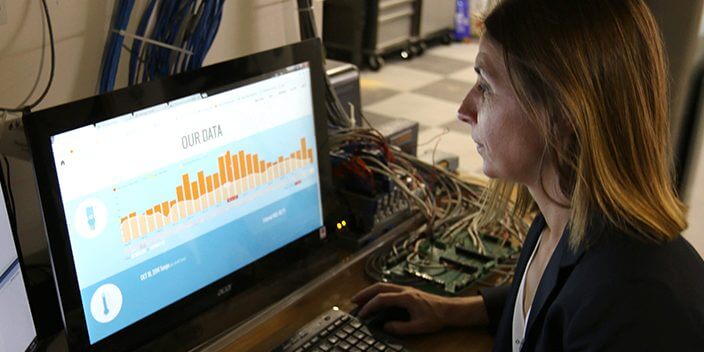Purdue receives supplement to $3.5 million energy use research award for ‘smart’ cities

WEST LAFAYETTE, Ind. — A Purdue University research team recently received a $400,000 supplement from the National Science Foundation (NSF) to further its work on “Sociotechnical Systems to Enable Smart and Connected Energy-Aware Residential Communities.” This award builds on an initial $3.5 million award made in 2018.
The multidisciplinary team, led by Panagiota Karava, the Jack and Kay Hockema Professor of Civil Engineering, includes faculty members in civil and mechanical engineering, political science communications and psychological sciences. All are affiliated with Purdue’s new Institute for a Sustainable Future.
The NSF project leverages smart devices (wall-mounted tablets and Alexa, Amazon’s cloud-based voice service) and social games to engage residents in understanding and reducing their home energy use. The team has made fundamental advances in physics-informed machine learning and game-theoretic approaches to discover how residential communities make decisions related to their home energy use. To do this, they developed a web-based application, MySmartEnergy (MySmartE), that was successfully deployed in 94 households in collaboration with the Indiana Housing Community Development Authority and BWI, an Indianapolis-based company specializing in sustainable, affordable housing. The team demonstrated a more than 35% household energy and cost savings in participating households.
“The work is important because it discovers new knowledge on how individuals, groups and residential communities make decisions related to their home energy consumption,” Karava says. “It also develops new smart technology to transform this often irrational, information-poor process into an information-rich and coordinated energy-management activity.
“NSF is funding this research because we developed sociotechnical approaches that are groundbreaking, and the private sector is partnering with us because there is tremendous potential to market our new smart technology and make societal impact.”
With the recent supplemental NSF funding, the Purdue research team will partner with BWI to broaden the impact of their research and implement their software solution. The team also will work with their industry partners through Purdue’s Center for High Performance Buildings to scale up further, reaching 500 households and covering more diverse population demographics including affordable and market-rate housing, as well as residential communities that represent U.S. building stock — both new construction and retrofits.
Karava’s team members are Ilias Bilionis, associate professor of mechanical engineering; James Braun, the Herrick Professor of Mechanical Engineering and professor of civil engineering; Leigh Raymond, professor of political science (College of Liberal Arts); Torsten Reimer, professor of communication and psychological sciences (College of Liberal Arts, College of Health and Human Sciences); Julia Rayz, professor of computer and information technology (Purdue Polytechnic Institute); and Thanh Nguyen, the Lewis B. Cullman Rising Star Associate Professor of Management (School of Management). As part of the new Institute for a Sustainable Future, the team’s efforts draw on previous work done by the former Center for the Environment and Climate Change Research Center. Karava will present the most recent results from the team’s project at Earth Charter Indiana’s Climate Leadership Summit at 11 a.m. on Friday, Sept. 9. The presentation can be accessed through ISF. For more information, contact rteas@purdue.edu.
MySmartE was disclosed to the Purdue Research Foundation Office of Technology Commercialization, which applied for a provisional patent on the intellectual property. For more information, contact Matt Halladay, mrhalladay@prf.org, about 2023-KARA-69985.
Writers: Lynne Dahmen, ldahmen@purdue.edu
Amy Raley, araley@purdue.edu
Source: Panagiota Karava, pkarava@purdue.edu